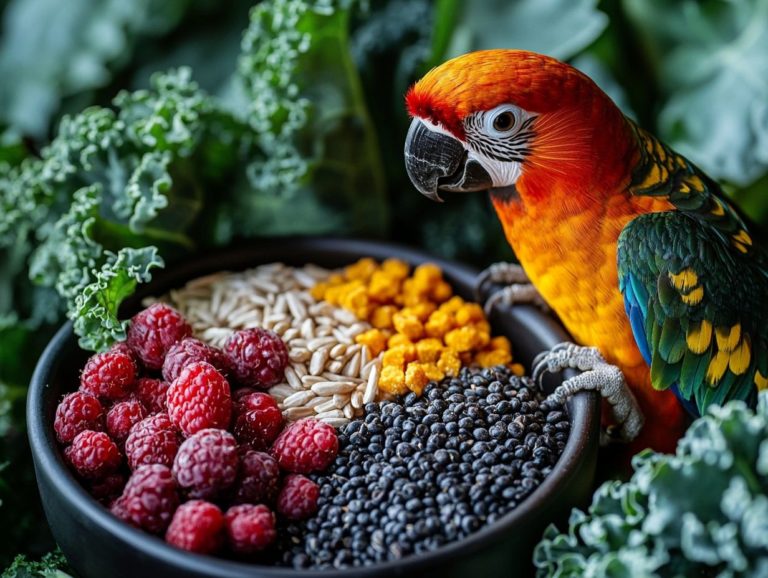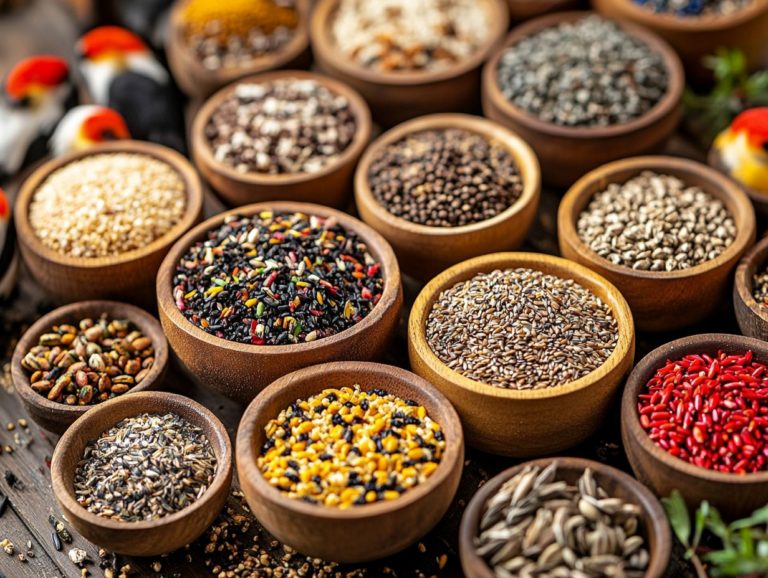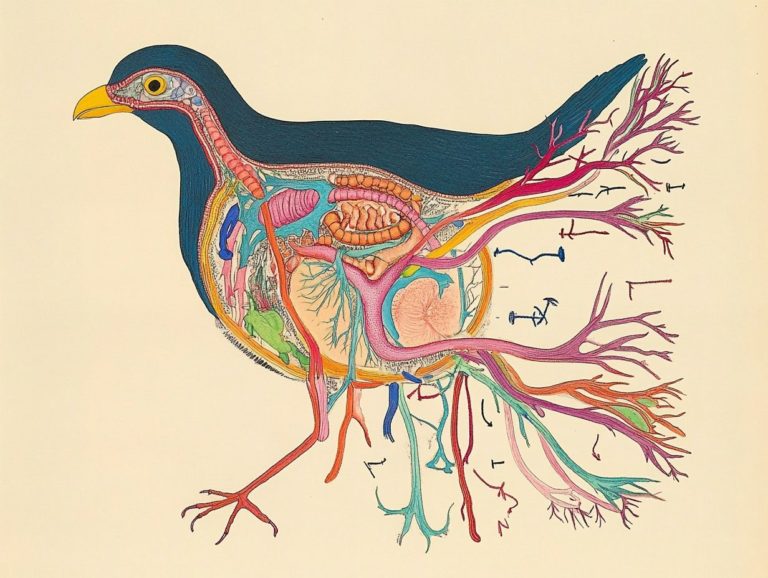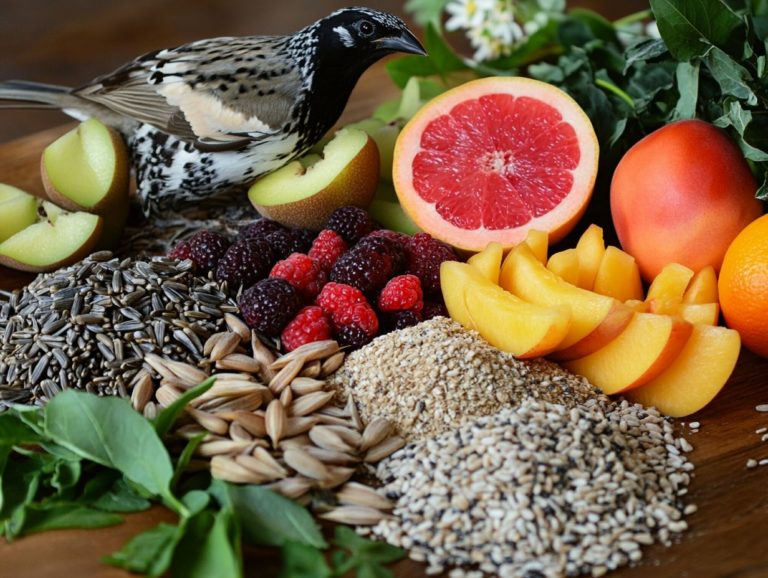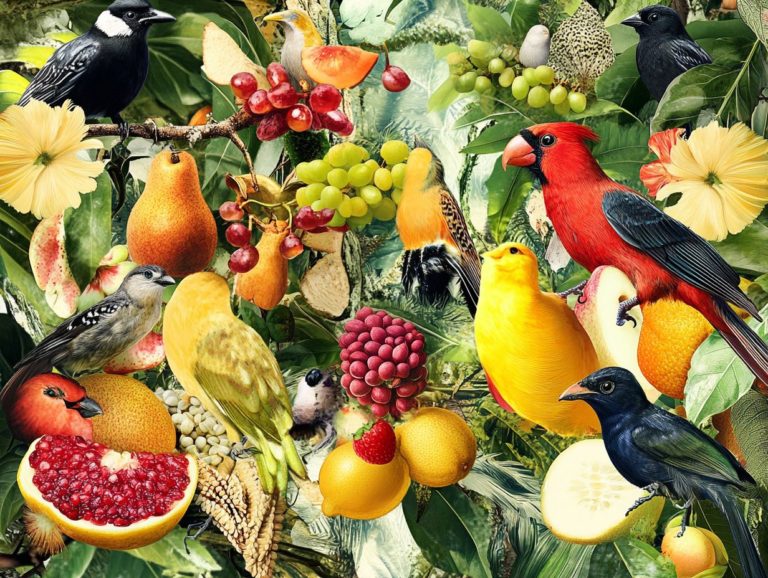The Importance of Variety in Bird Diet
Discover how to give your feathered friends the vibrant life they deserve! Birds are truly captivating, and their dietary needs are as complex as their behaviors. Providing them with a balanced diet filled with essential nutrients is vital for their overall health.
This article dives into the crucial nutrients your birds require, the risks of a boring diet, and the benefits of adding variety to their meals. You’ll find practical tips for introducing new foods, along with myths about bird nutrition that need debunking. Let’s dive into the nutrients that will help your birds thrive!
Unlock the secrets to ensuring your feathered friends not only survive but truly thrive!
Contents
- Key Takeaways:
- Understanding the Nutritional Needs of Birds
- Why A Boring Diet Can Harm Your Birds
- Benefits of a Varied Diet for Birds
- Transform Your Bird’s Diet with Exciting New Foods!
- Common Misconceptions About Bird Diets
- Frequently Asked Questions
- What is the importance of variety in bird diet?
- What happens if birds do not have a varied diet?
- What types of food should be included in a bird’s varied diet?
- Why is it important to rotate food in a bird’s diet?
- Can a lack of variety in a bird’s diet lead to obesity or other health complications?
- How can I ensure my pet bird is getting enough variety in its diet?
Key Takeaways:
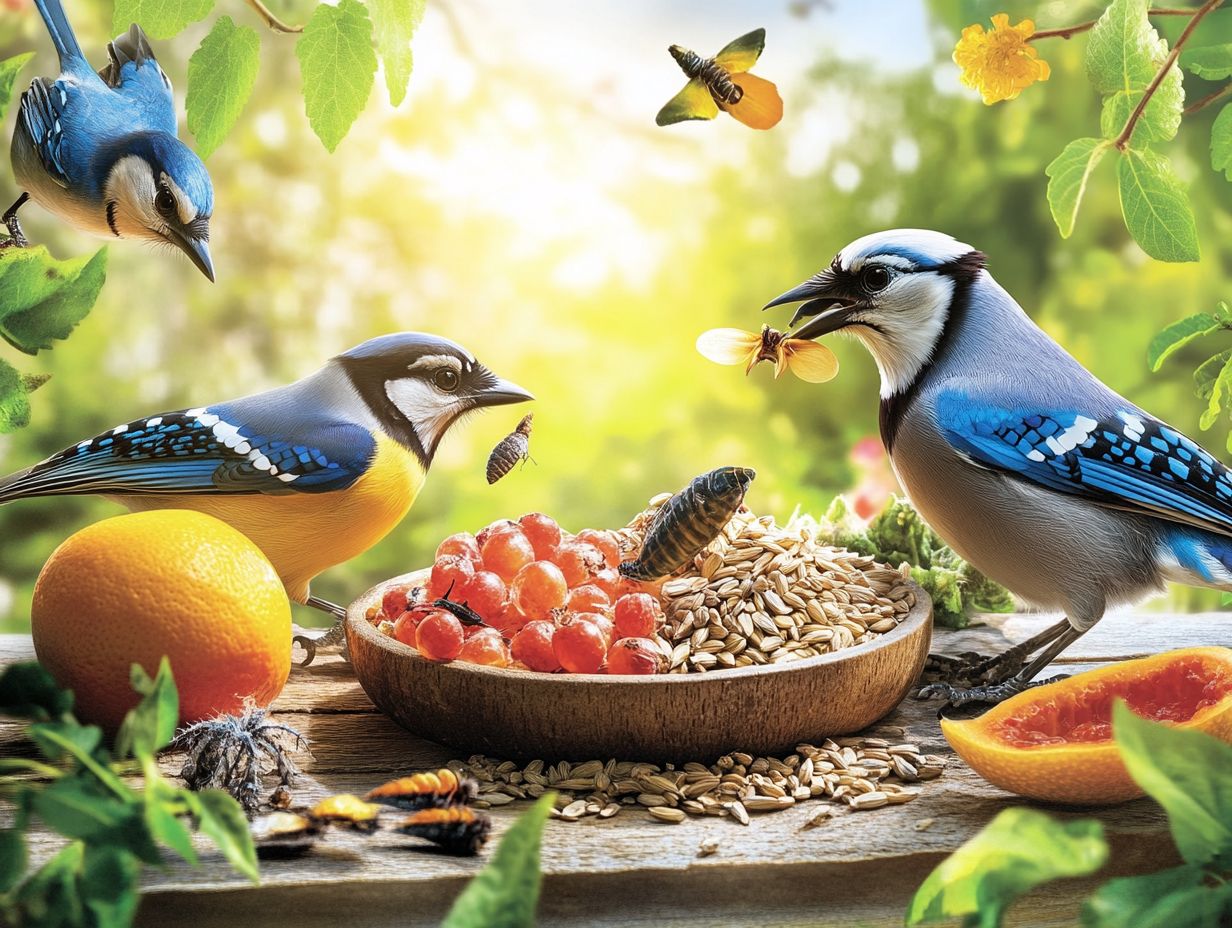
- A varied diet is crucial for the optimal health of birds, as it provides essential nutrients and prevents health risks and deficiencies.
- Introducing variety into a bird’s diet can be accomplished through simple tips and tricks, such as gradually adding new foods and ensuring a balanced mix of different food groups.
- There are many misconceptions about bird diets, and it’s important to debunk these myths to provide proper nutrition for our feathered friends.
Understanding the Nutritional Needs of Birds
Understanding the nutritional needs of birds is vital for ensuring a healthy life for various species. Just like humans, wild birds have specific dietary needs that must be met to maintain optimal health and avert potential health issues.
Proper nutrition entails offering a balanced diet that includes a variety of foods rich in essential nutrients, including proteins, vitamins, and minerals. It s crucial to consider the dietary differences among bird species and consult with a bird vet to tailor diets that meet their unique needs.
Essential Nutrients for Optimal Health
Providing essential nutrients is crucial for your birds’ optimal health, as these nutrients play a significant role in their growth and overall well-being.
A well-balanced diet ensures that each bird receives the necessary proteins, vitamins, and minerals that form the foundation of their dietary needs. For example, proteins are vital for muscle development, while calcium is critical for strong bones and egg production in females. Vitamins such as A, D, and E enhance immune function and promote healthy skin.
Understanding the specific dietary requirements of different species gives you the power to make informed adjustments, ensuring that your feathered companions thrive, showcasing vibrant plumage and abundant energy. Incorporating a variety of seeds, fruits, and commercial pellets tailored to each bird’s needs will significantly enhance their nutritional profile.
Why A Boring Diet Can Harm Your Birds
A monotonous diet can pose serious risks to birds, leading to not getting enough of the right foods and a host of health complications over time. If a bird is fed unhealthy options or a limited variety, it may struggle to meet its dietary needs, ultimately resulting in poor health and diminished vitality.
Recognizing why variety in diet matters is crucial; it helps prevent feeding habits that could lead to these detrimental effects. Ensuring a diverse and balanced diet is key to promoting the overall well-being of your feathered companions.
Health Risks and Deficiencies
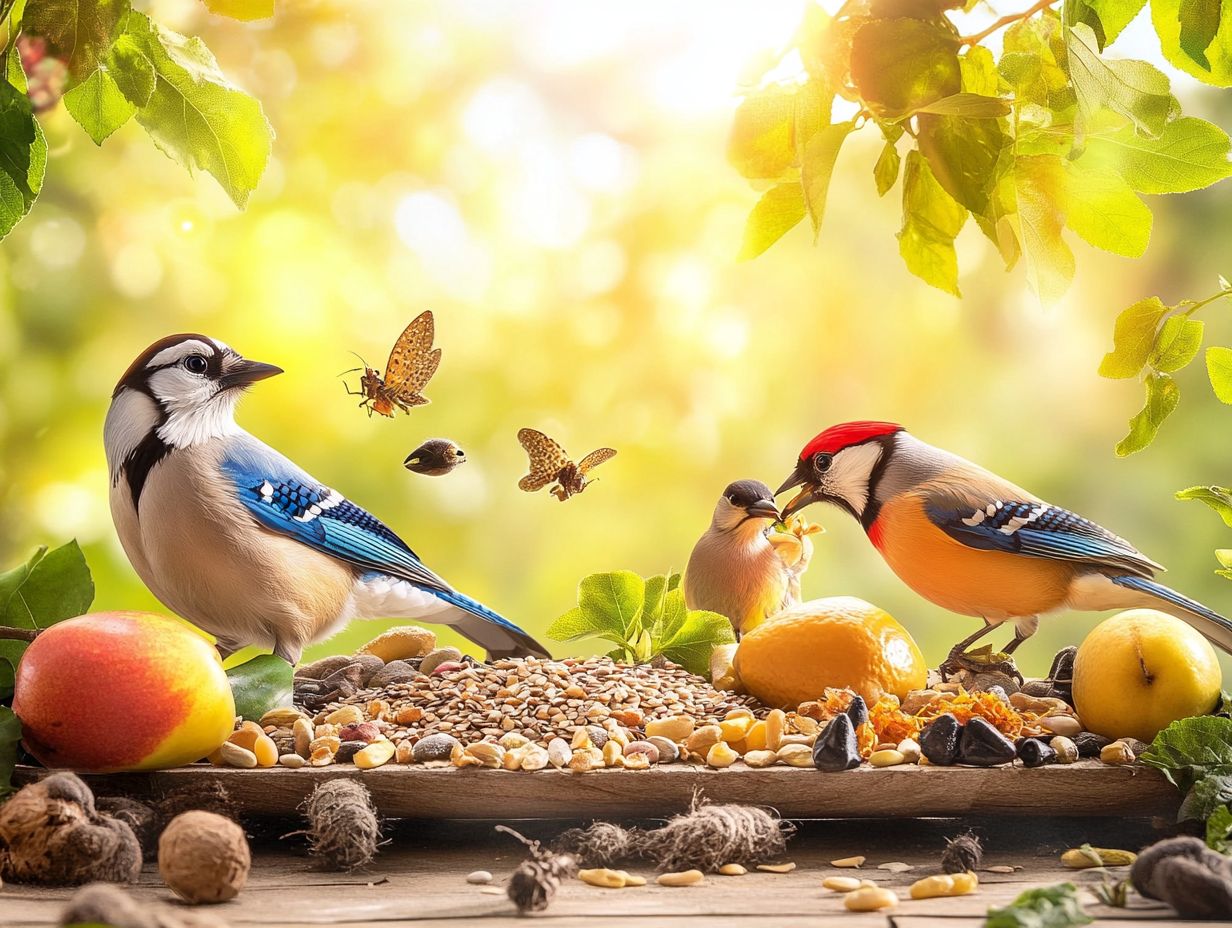
Birds suffering from nutritional deficiencies often encounter serious health risks that can compromise their overall well-being and longevity.
When essential nutrients like protein and calcium are lacking, significant health issues can arise, including weakened immune systems and bone disorders. You might notice that insufficient protein intake leads to poor feather quality and reduced energy levels, hindering their ability to thrive. Additionally, low calcium levels can result in brittle bones and reproductive complications, which affect not only individual birds but also breeding populations.
Vital vitamins, such as A, D, and E, play critical roles in supporting vision, bone health, and antioxidant defenses. Ensuring a balanced diet rich in these nutrients is essential for safeguarding avian health and extending their lifespan.
In conclusion, providing a varied and balanced diet is fundamental to your birds’ health. By understanding their nutritional needs and debunking myths about bird diets, you can ensure that your feathered friends live happy and vibrant lives. What delicious foods are you planning to introduce to your bird?
Benefits of a Varied Diet for Birds
A varied diet offers substantial benefits for birds, supplying them with the important nutrients needed to flourish and enhancing their overall well-being.
Incorporating a diverse array of foods, including fresh fruits and vegetables, satisfies their dietary needs and encourages healthier feeding habits.
This delightful variety enriches their lives, ensuring they receive a nutritious diet that supports their long-term health.
Improved Nutritional Intake and Overall Health
Improved nutritional intake is essential for enhancing the overall health of birds. It ensures they receive vital nutrients that maintain their vitality.
Incorporating a diverse diet featuring high-quality protein sources like mealworms and a variety of soft foods significantly supports your feathered friends’ growth, energy levels, and immune function.
These food types provide the necessary amino acids for muscle development and encourage healthy feathering and vibrant plumage.
Including fruits, vegetables, and grains in their diet plays a critical role in delivering essential vitamins and minerals, which contribute to better digestion and overall vitality.
A balanced and enriched diet creates a thriving environment, allowing your birds to thrive in both physical and emotional health.
Transform Your Bird’s Diet with Exciting New Foods!
Incorporating variety into a bird’s diet is vital for their health and well-being. There are several effective strategies to achieve this.
Offer a diverse range of foods, including fresh fruits, vibrant vegetables, and protein-rich snacks, to cater to their dietary needs while keeping them engaged.
By understanding their feeding behavior, you can make thoughtful dietary adjustments that promote a balanced diet and ensure they receive optimal nutrition throughout the year.
Tips and Tricks for Introducing New Foods
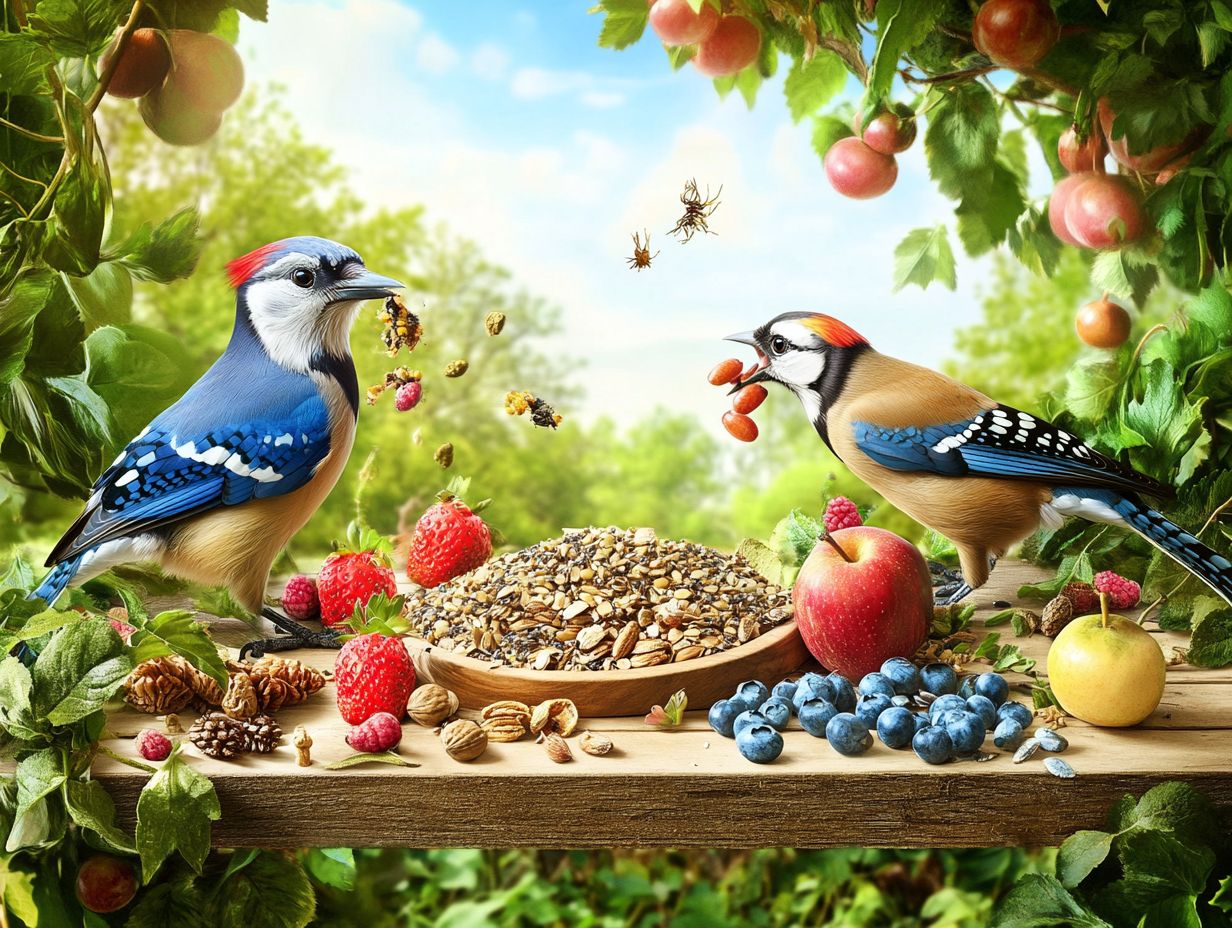
Introducing new foods to your birds requires a thoughtful approach to encourage acceptance and promote a healthy diet.
It can be tricky, but don’t worry! Your birds are worth it! Many birds tend to be set in their ways and may resist trying unfamiliar options.
Gradually incorporating new items can lead to positive changes in their diet. Start by offering small portions of nutritious snacks alongside their favorites, allowing them to explore at their own pace.
Natural enrichment, such as interactive feeding toys, can pique their interest and make the introduction of new foods feel less intimidating.
Varying textures and colors will capture their attention, enhancing their overall dietary health and improving their feeding preferences over time.
Common Misconceptions About Bird Diets
You might encounter various misconceptions about bird diets that can lead to unhealthy feeding practices, ultimately affecting their overall well-being.
Debunking Myths and Misinformation
Debunking myths about bird diets is essential for ensuring your feathered friends receive the proper nutrition they need to thrive in a healthy environment.
It’s important to know that seeds alone do not provide enough nutrition for these avian companions. Believing this can lead to serious health issues like weakened immune systems and shorter lifespans.
A balanced diet includes a variety of fruits, vegetables, and specialized pellets. Misinformation about safe and unsafe food items can expose your birds to harmful substances, jeopardizing their well-being.
By educating yourself about avian dietary needs, you foster a more responsible approach to bird care, ensuring these magnificent creatures lead vibrant and fulfilling lives.
Frequently Asked Questions
Start today! Your feathered friend will love the tasty variety.
What is the importance of variety in bird diet?
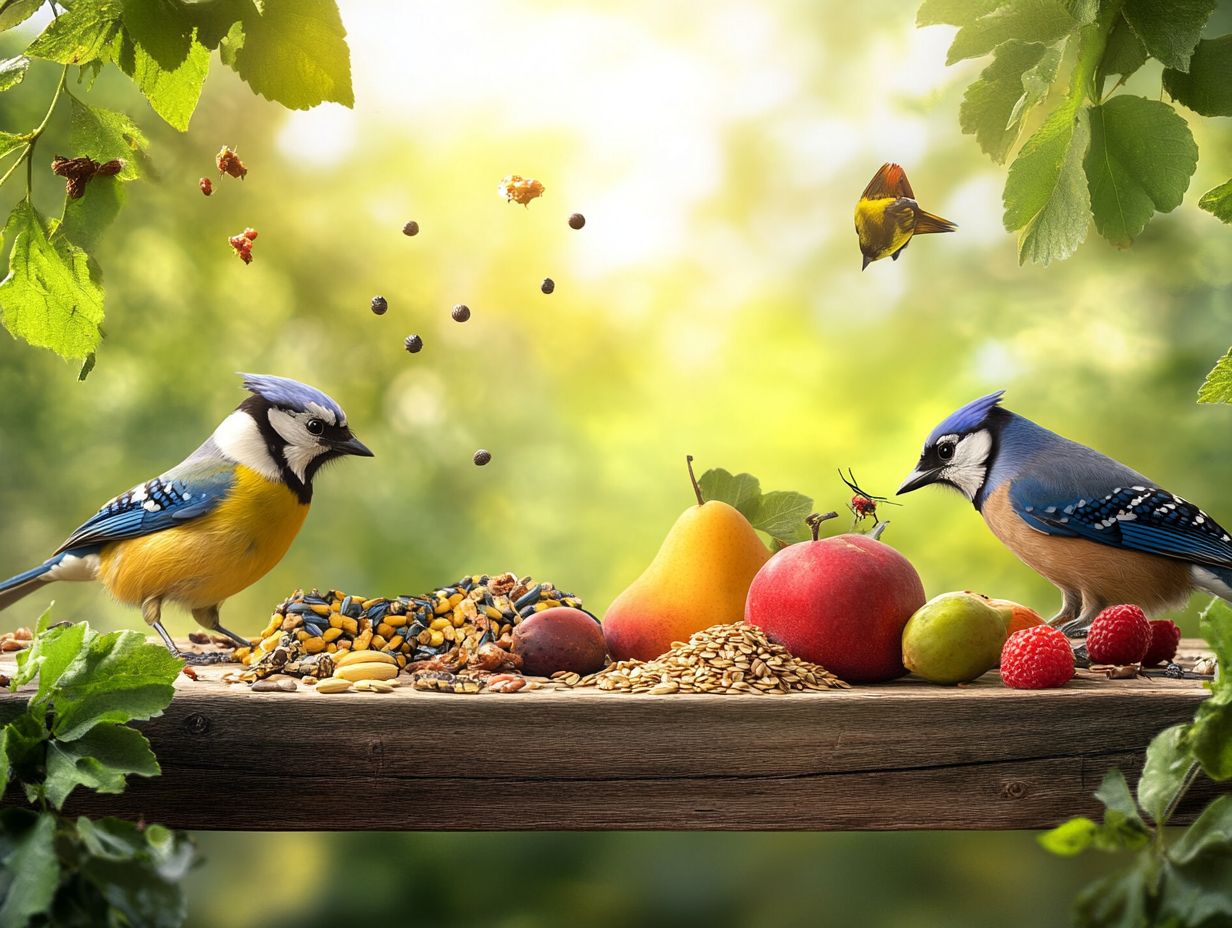
Variety in a bird’s diet is essential for health and nutrition. Just like us, birds need diverse nutrients to thrive, and offering variety in bird toys can also contribute to their overall well-being.
What happens if birds do not have a varied diet?
A lack of variety can cause nutritional deficiencies. This may lead to weak immune systems, stunted growth, and reproductive issues.
What types of food should be included in a bird’s varied diet?
A bird’s diet should include fruits, vegetables, grains, seeds, and protein sources like insects and eggs. This mix ensures all nutritional needs are met.
Why is it important to rotate food in a bird’s diet?
Rotating food helps prevent picky eating habits. It also mimics a bird’s natural diet and ensures a range of nutrients.
Can a lack of variety in a bird’s diet lead to obesity or other health complications?
Yes, a dull diet can lead to obesity. Birds may overeat the same food, causing nutrient imbalances and weight gain.
How can I ensure my pet bird is getting enough variety in its diet?
To ensure variety, offer different foods daily and rotate them regularly! Consult a veterinarian for tailored dietary guidance.

